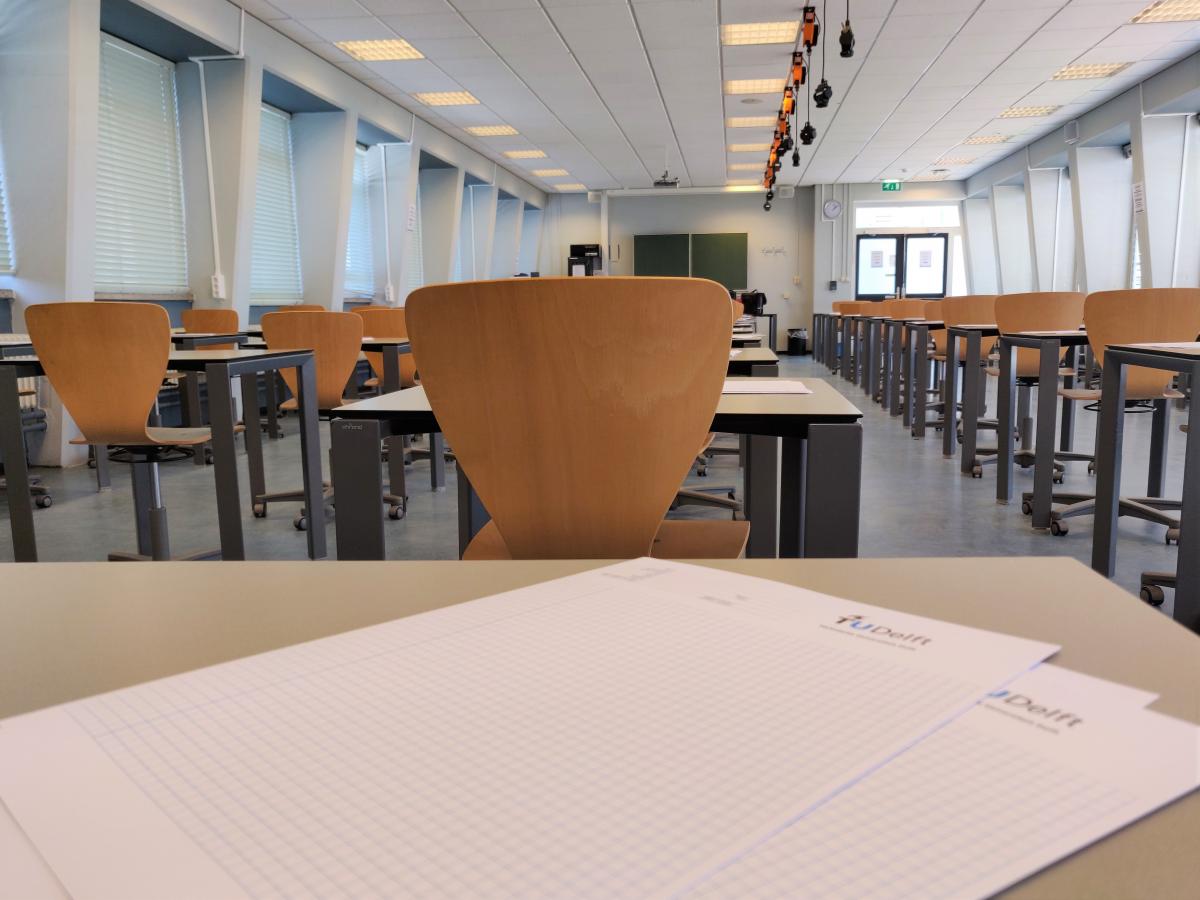Students who do not want online proctoring can do their exams under surveillance at TU Delft this exam period. This is a pilot involving 24 students.
This is not the room where participants of the pilot take their exams. (Photo: Marjolein van der Veldt)
Online proctoring, whereby students are monitored during exams through their own webcams and microphones, has popped up regularly in discussions since the outbreak of Covid-19. Students and their organisations are happy that the exams are going ahead, but at the same time have questions about the use of surveillance software. They wonder if it is desirable that the video images of students, their eye movements, their rooms, their possessions, and their voices are sent to servers abroad.
In the last academic year, more than 2,500 TU Delft students signed a petition against the use of surveillance software. Students are taking action at other universities too. The Student Council at TU Delft asked for an alternative method for students who have major privacy objections or do not have a good work environment.
Exams on campus
That alternative is now here. During the exam period, TU Delft will offer an opt-out pilot that will allow students to do their exams on campus under the watchful eye of proctors instead of in their student rooms with surveillance software.
Twenty-four students have signed up for the pilot while there was space for 30 students a day, says Willem van Valkenburg, Chair of the Exam Task Force. Of these, about 40% signed up because of privacy reasons, 20% because of personal circumstances, and another 40% because they do not have a good space to do the exams. “We approached students from a housing complex on the Stieltjesweg as they are living next to the Echo, the new education building, construction site.”
The pilot will be evaluated at the end of this quarter. “We will look at various issues such as if the increased traffic on campus will put safety at risk.” While TU Delft has barely promoted the opt-out option, the number of participants will also be part of the evaluation. If everything goes well, TU Delft will include the opt-out option in the online proctoring regulations and this may bring space for more students.
How many proctored exams are there?
This exam period, teachers have chosen online proctoring for about 70 of the over 400 subjects. This accounts for about 15% of the exams. In the last exam period of the previous academic year, this figure was significantly lower at 5%.
Van Valkenburg believes that this is because many more large scale disciplines such as mathematics are on the programme. “Teachers may only choose online proctoring as a last resort. This is seen most in subjects such as maths as these exams have large groups of students and cheating is relatively easy. You can fill in any mathematical formula on Google and get an answer.”
What companies will oversee the exams?
TU Delft has chosen RP Now, an American company with branches and data centres in the European Union. RP Now staff and sub-contractors assess video images of the exams and send any suspicious images to the teachers. The Board of Examiners ultimately decide whether there was cheating.
TU Delft had its eye on a different company during the last academic year: the infamous Proctorio (in Dutch) that used artificial intelligence and face recognition technology to trace incidents of fraud. Over the last few months in particular, there has been a groundswell of criticism against Proctorio. Founder Mike Olsen had to go through the mill after he placed a transcript of a discussion between a student and a help desk employee on Reddit. And this month a disruption during an exam at the company led to problems at the University of Amsterdam, the Free University and Maastricht University. Over the last academic year, TU Delft tested Proctorio’s software and started contract negotiations. But, reports Van Valkenburg, the discussions stranded on privacy issues.
While Proctorio seems to be going from one disaster to the other, things around RP Now are quiet. Still, this does not automatically mean that students’ data is safe. Surf, an institute that promotes IT in education, issued a white paper on online proctoring in which it states that RP Now does not clearly define what it understands under the term ‘personal data’ and what it does with the data it collects. In light of this, TU Delft has included additional conditions such as a confidentiality statement with the software company.
Just like its competitor Proctorio, RP Now saves personal data in the United States. And this creates a new problem. This summer, European judges declared the ‘Privacy Shield’ between Europe and the USA invalid (in Dutch) because the agreement does not sufficiently protect the privacy of European citizens. This verdict has far reaching implications, including for TU Delft. Van Valkenburg says that “At the time, the Executive Board decided to continue all the current contracts. We are now working on filling the gaps by making stricter agreements.”
- Delta wants to learn from your experiences with online proctoring. What is it like to take an exam with a webcam aimed at you? Have you experienced any problems with the software while making your exam? Mail us at delta@tudelft.nl if you want to share your experience or opinion with us.
Do you have a question or comment about this article?
a.m.debruijn@tudelft.nl


Comments are closed.